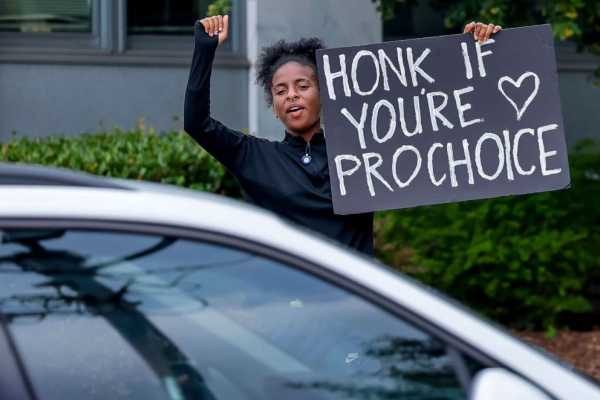A two-day trial began in Georgia Monday that will decide whether a six-week abortion ban is legal under the state's constitution.
The so-called "heartbeat bill" was signed into law in 2019 by Gov. Brian Kemp but was prevented from going into effect following legal challenges.
MORE: How some providers are working around abortion bans since Roe v. Wade was overturned
In July, three weeks after the Supreme Court's reversal of Roe v. Wade, a federal appeals court ruled the ban could go into effect.
The law prevents abortions from performed once fetal cardiac activity can be defected, which typically occurs at about six weeks' gestation — before many women know they're pregnant — and redefines the word "person" in Georgia to include an embryo or fetus at any stage of development.

A woman holds a sign as a small group of pro-abortion rights demonstrators protest outside the Georgia State Capitol after the Supreme Court’s decision on the Dobbs v Jackson Women’s Health Organization ruling in Atlanta, June 28, 2022.Erik S Lesser/EPA via Shutterstock
There are exceptions for rape or incest until 22 weeks of pregnancy as long as the victim has reported the crime to the police. Additionally, a patient can have an abortion past 22 weeks if the fetus has defects and would not be able to survive or if the patient's life is in danger.
A lawsuit was filed days after the ban went into effect by several groups including the American Civil Liberties Union, ACLU of Georgia, the Center for Reproductive Rights, the Planned Parenthood Federation of America and the SisterSong Women of Color Reproductive Justice Collective.
The groups argue the law violates the right to privacy without political inference protected under the Georgia Constitution.
MORE: Young women are angry about abortion rights, but will they tip the midterm elections?
"For months, countless Georgians have been denied access to the abortion care they need and subjected to the severe, life-altering effects of forced pregnancy and childbirth," the groups said in a statement Monday. "The impacts have been devastating, especially for Black women in Georgia, who are over two times more likely than white women to die of pregnancy-related causes and face structural racism in our health care system."
"Georgia's state constitution clearly prohibits this extreme political interference with people's bodies, health, and lives. We are asking the court to act quickly to put an end to this crisis, protect bodily autonomy, and restore Georgians' ability to access this essential health care," the statement continued.
The governor's office did not immediately return ABC News' request for comment.
Sourse: abcnews.go.com






